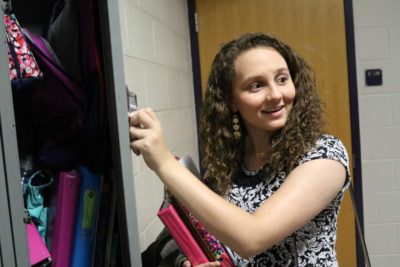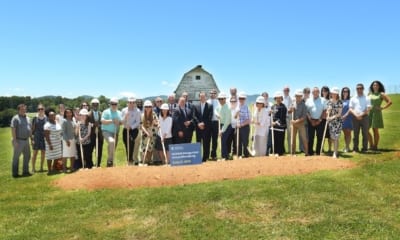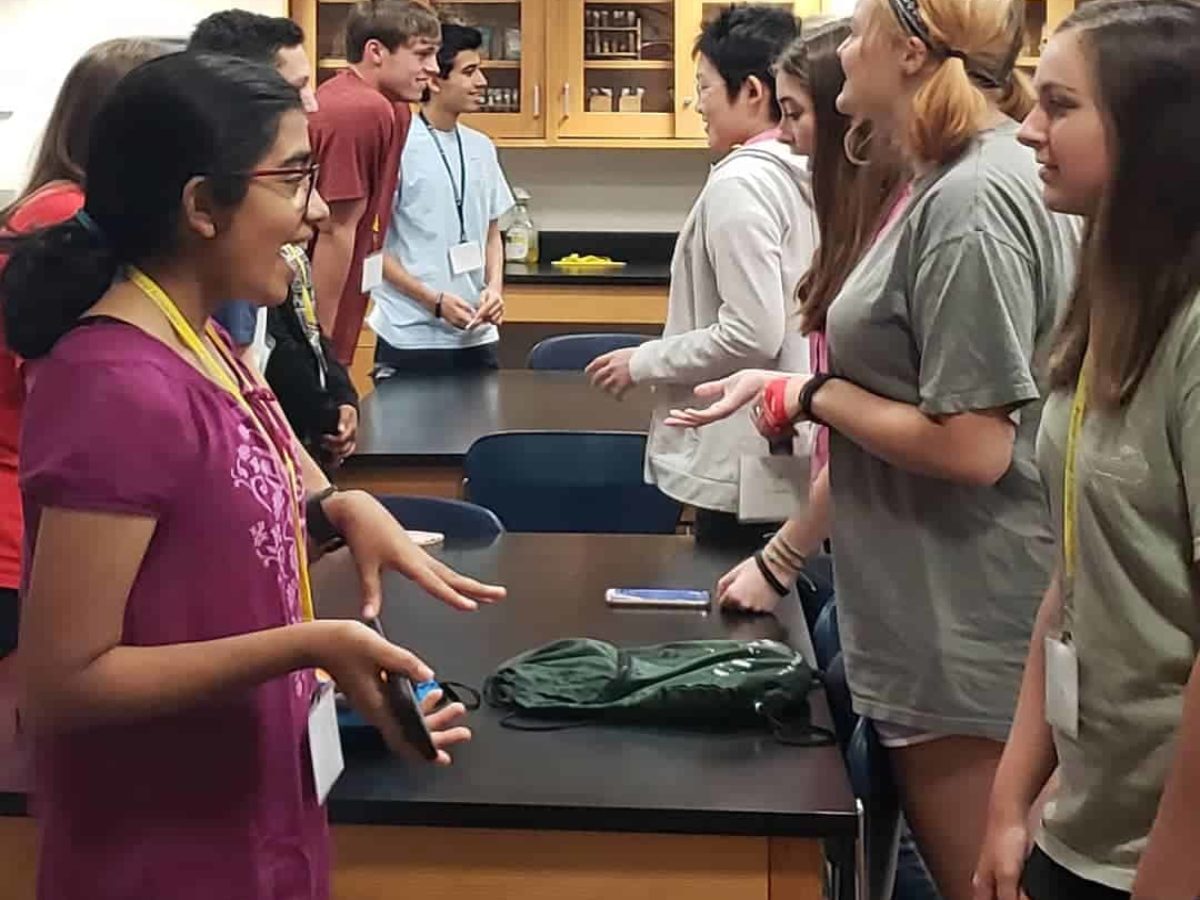
Welcome to our monthly feature on EducationNC called the NC STEM ScoreCard, written in partnership with the NC Science, Mathematics, and Technology Education Center (SMT) and the Burroughs Wellcome Fund. The previous edition of the STEM ScoreCard featuring STEM initiatives in the UNC Laboratory Schools can be found here.
The goal of the NC STEM ScoreCard is to build broader awareness of how P-20 STEM* education is being nurtured across North Carolina and the impact on the well-being of our citizens and state.
*Note: STEM here is an acronym for Strategies That Engage Minds.
Three key questions framing this goal are:
- In what ways does the state directly invest in programming and innovations that promote STEM learning?
- In what ways are significant philanthropies and other organizations supporting STEM education and learning in North Carolina?
- What measurable impacts are North Carolina realizing from its strategic investments?
Strategic investment in specific programs that increase the numbers, quality, and impact of STEM teachers in North Carolina is a central focus of the NC STEM ScoreCard. One of those investments is in the internationally-acclaimed North Carolina School of Science and Mathematics (NCSSM).
NC School of Science and Math
NCSSM is the nation’s first public residential high school for science, technology, engineering, and math and a global leader in STEM education.
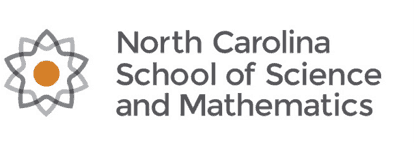
Brief history
The North Carolina General Assembly established the North Carolina School of Science and Mathematics in 1978 to provide challenging educational opportunities for students with special interests and potential in the sciences and mathematics.
In 1980, during Gov. James B. Hunt’s first administration, NCSSM opened on the grounds of the former Watts Hospital in Durham with 150 high school juniors. It was the first school of its kind in the United States — a public, residential high school welcoming students from across the state to study a specialized curriculum emphasizing science and mathematics, but also offering humanities courses, athletics, and extracurricular opportunities.
In 1988, together with peers at a handful of similar schools, NCSSM leaders helped found the National Consortium of Specialized Secondary Schools of Math, Science and Technology, now the National Consortium of Secondary STEM Schools.
In 2007, the General Assembly and the UNC Board of Governors approved NCSSM as the 17th constituent institution of the University of North Carolina system.
Mission
The mission of North Carolina School of Science and Mathematics is to: educate academically talented students to become state, national, and global leaders in science, technology, engineering, and mathematics; advance public education in North Carolina; and inspire innovation for the betterment of humankind, through challenging residential, online, summer, and virtual learning driven by instructional excellence and the excitement of discovery.
Vision
NCSSM’s three founders — former North Carolina Gov. Hunt, senator and Duke University President Terry Sanford, and academician and author John Ehle — envisioned an institution that would invest in the state’s human and intellectual capital to build leadership and economic progress.
Demographics of residential program
NCSSM is legislatively mandated to admit an approximately equal percentage of students from each of the state’s U.S. congressional districts. Applicants thus compete for enrollment with other students in their congressional district rather than competing with every applicant across the state. This ensures that the NCSSM student body includes a wide geographic representation.
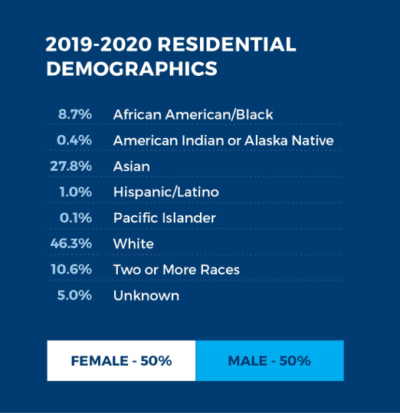
NCSSM serves approximately 680 students in its residential program and aspires for its student population to be a demographic reflection of the population of North Carolina as a whole. The school is making extra efforts to recruit more underrepresented minority populations and students from tier 1 and tier 2 counties in North Carolina.
During the 2019-2020 school year, 50.4% of residential students are female and 49.6% are male. Some 46.3% are White, 27.8% are Asian, 10.6% are Multiracial, 8.7% are Black, 1.0% are Hispanic, 0.4% are Native American, and 0.1% are Pacific Islander.
Distance education and extended programs to broaden the reach
NCSSM offers NCSSM-Online, a dual-enrollment program that allows some 400 additional North Carolina students per year to remain enrolled at their local high school while taking courses through the internet taught by NCSSM.
In addition, the school offers open enrollment courses using interactive video conferencing, which allows local high schools to offer advanced courses for which they don’t have enough students or do not have an instructor.
NCSSM’s distance education programs have grown to serve nearly 1,000 students with courses each year, reaching 79 counties and 210 schools across North Carolina in the 2018-2019 academic year. With the opening of the Morganton campus, NCSSM will be able to serve an additional 300 residential students.
Since the very first 150 students enrolled in 1980, NCSSM has educated more than 11,000 students from every corner of North Carolina. This map of North Carolina shows that as of October 2019, NCSSM was serving students from 94 of the state’s 100 counties. Admissions recruiters visit every county in the state every year in an effort to serve all 100 counties.
Evidence of student success
- NCSSM students earn more National Merit scholarships than any school in the state.
- In 2018, 64% of NCSSM graduates enrolled in a public or private North Carolina University, with 57% attending public universities, retaining these talented students in North Carolina.
- About 65% of NCSSM college graduates earn a degree in a STEM field, nearly three times the national average.
- Up to 70% of NCSSM graduates hold a master’s or doctorate degree, which is more than five times the national average.
- More than half of NCSSM’s 11,000+ alumni live in and pay taxes in North Carolina.
- The average annual personal income of NCSSM alumni is more than $110,000 according to the school’s most recent alumni survey.
- The top five fields in which alumni are employed are the high-wage, high-demand sectors of information technology, management, education, medicine, and engineering.
- Research has shown positive impacts for rural and underrepresented minority students from attending NCSSM, including increased application and acceptance rates to highly selective universities.
Student awards
Within the last five years, NCSSM students have won or placed in the Singapore International Mathematics Challenge, Conrad Spirit of Innovation Award, Moody’s Mathematics Challenge, and scores of other contests, proving that North Carolina students can compete and win globally.
- NCSSM is the No. 1 high school worldwide for student winners of the Siemens Competition in Math, Science, and Technology — one of the foremost such competitions globally.
- NCSSM is the No. 4 high school in the nation for number of semifinalist appearances in the Regeneron Science Talent Search (formerly Intel Science Talent Search), with one finalist in 2019.
- First and second places were won by NCSSM teams in the 2015 Moody’s Mega Math Challenge.
- There were two winning NCSSM teams in the 2015 Conrad Spirit of Innovation competition
- NCSSM was one of 27 schools named an “Elite Public High School” by the Challenge Index.
- For nine years, NCSSM teams have won at least one award of distinction in the Singapore International Mathematics Challenge — every year except 2012, when NCSSM was named grand champion.
- NCSSM’s FIRST Robotics team, Team 900, The Zebracorns, has garnered 26 robotics awards.
Faculty and school awards
- In 2019, math instructor Cheryl Gann and chemistry instructor Bob Gotwals were honored as state-level finalists for the Presidential Awards for Excellence in Mathematics and Science. At least eight other faculty members have previously been named finalists.
- All NCSSM instructors have a master’s degree or higher, with 43% holding doctoral degrees, and one-third nationally board certified.
NCSSM-Morganton
In 2015, North Carolina voters passed the Connect NC bond package which included $58 million to grow a second campus of the North Carolina School of Science and Mathematics in Morganton. After advance planning was completed, the actual cost of the project was estimated to be higher, and in 2018, the NC General Assembly appropriated $15 million more toward the construction, with the school’s foundation pledging to raise at least $10 million in private donations for the project.
A no-longer-used portion of the NC School for the Deaf campus was selected as the site for the campus, with two historic buildings that will be renovated and space for a new academic commons building, a dormitory, and a student wellness and activity center to be built, among others. The project broke ground in June 2019, and construction is underway.
Drawing on the regional presence of international technology companies, data science will be a defining feature of the NCSSM-Morganton experience. NCSSM will open the Morganton campus with an initial capacity of 300 students in the residential program. The campus will be equipped with distance learning technology so that classes can be shared with NCSSM-Durham and NCSSM-Online, and theirs with NCSSM-Morganton. To learn more about the overall vision and master plan for the Morganton Campus of NCSSM, click here.
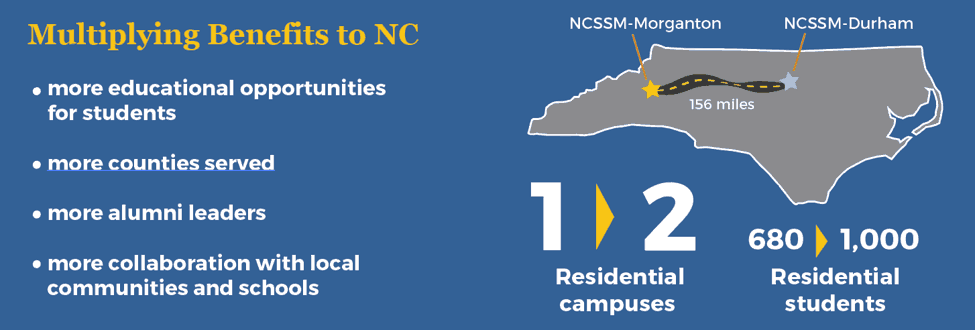
Questions for maximizing this strategic investment in STEM teacher quality
1. NCSSM is a remarkable resource for North Carolina whose benefits are realized over an extended time frame. Could marketing strategies help the policy community, educators, and citizens in general to better understand the potential for even larger impacts of NCSSM?
2. As a unique institution within the University of North Carolina System, what policy changes could made by the UNC Board of Governors that would be even more beneficial to NCSSM students and to the public schools of North Carolina?
3. NCSSM has had a long history of working collaboratively with others, but in what ways could those relationships mature into stronger partnerships that support increased collective action to improve STEM education across North Carolina?
Thanks to the following individuals for their assistance in compiling this ScoreCard: Todd Roberts, Chancellor; Melissa Thibault, Vice Chancellor for Distant Education & Extended Programs; Brock Winslow, Vice Chancellor for Institutional Advancement; Krissi Hewitt, Director of Institutional Research & Strategic Initiatives and Chief Financial Officer; Bryan Gilmer, Director of Communications, NC School for Science and Mathematics
Recommended reading
